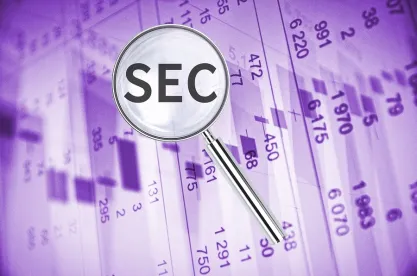While many businesses and government offices have closed or slowed as a result of the onset of COVID-19, the Securities and Exchange Commission remains open for business. On April 3, 2020, Sagar Teotia, the SEC’s Chief Accountant, made clear that the SEC “is closely monitoring the impact of issues raised by [COVID-19] on investors and global capital markets.” SEC Chairman Jay Clayton explained that some of this monitoring has been through “numerous discussions with market participants—including investor and industry groups” and identified four areas of SEC focus in response to the COVID-19 crisis:
-
Maintaining the continuity of Commission operations;
-
Monitoring market functions and system risks;
-
Providing prompt, targeted regulatory relief and guidance to facilitate continuing operations and execution of business continuity plans (BCPs); and
-
Maintaining enforcement and investor protection efforts, particularly with regard to the protection of critical market systems and the most vulnerable investors.
The fourth bullet point indicates a potential for increased SEC investigations and enforcement actions arising from the COVID-19 crisis. One area that may see increased attention from the SEC’s Division of Enforcement is insider trading. In a March 23, 2020 statement, the Co-Directors of the Division of Enforcement described the unique opportunities corporate insiders may have to engage in illegal insider trading in light of COVID-19:
“[i]n these dynamic circumstances, corporate insiders are regularly learning new material nonpublic information that may hold an even greater value than under normal circumstances. This may particularly be the case if earnings reports or required SEC disclosure filings are delayed due to COVID-19. Given these unique circumstances, a greater number of people may have access to material nonpublic information than in less challenging times. Those with such access – including, for example, directors, officers, employees, and consultants and other outside professionals – should be mindful of their obligations to keep this information confidential and to comply with the prohibitions on illegal securities trading. Trading in a company’s securities on the basis of inside information may violate the antifraud provisions of the federal securities laws.”
As previously reported in another Polsinelli alert, which can be found here, the SEC also has noted that it will be scrutinizing corporate disclosure controls and procedures to protect against the improper dissemination of material nonpublic information. And as the Co-Directors explained, “the Enforcement Division is committing substantial resources to ensuring that our Main Street investors are not victims of fraud or illegal practices in these unprecedented market and economic conditions.”
It is imperative that individuals and corporations be especially cognizant of their use and dissemination of material nonpublic information as it relates to COVID-19’s impact on their business. Make no mistake, the SEC is paying special attention. SEC investigation and enforcement cases are expected to rise as a result.





 />i
/>i
